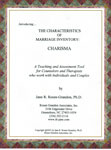Featured Products
Research on Marital Satisfaction
The study of marital satisfaction has a long and well-documented history but the consistently high divorce rates illustrate that still too little is known about ways to achieve and maintain a sufficient level of marital satisfaction to assure marital success.
Historically, marriage researchers have studied either the effects of marital characteristics, marital behaviors, effects of gender, and differences in marital satisfaction by life stage. While research has attempted to account for some of the influences on marital satisfaction, it is time to consider more complex models, to account for the interrelationships between a variety of influences on marital satisfaction. Perhaps someday it will be possible to “crack the code” on marital satisfaction.
Marital satisfaction is a unique measure because it refers to:
- Marital satisfaction is how you rate your marital satisfaction;
- since marital satisfaction is subjective, no one else can tell you how satisfied you are with your marriage!
- marital satisfaction refers to the condition of your marriage as you experience it; and
- marital satisfaction is a highly complex and personal experience. Feeling satisfied is related to our childhood, to our ability to feel satisfied, it is influenced by our parent’s marriage, our previous relationships, the nature of our interactions with our mates, and the environment in which we live.
The CHARISMA Research described here was designed to provide a better understanding of the factors which contribute to, or detract from, marital satisfaction.
What determines Marital Satisfaction?
Some factors which effect our ability to feel satisfied include:
- Aspects of our Personality which we bring from our childhood and family of origin;
- Aspects of our Personality which developed during previous relationships with others;
- Behavior Patterns which evolved within our families of origin;
- Behavior Patterns which have evolve within relationships;
- The healthiness or unhealthiness of the environment in which we live;
- The way we relate to the environment in which we live.
In the effort to develop a more comprehensive model of marital satisfaction, a study was designed which would measure the role of several different factors: marital characteristics, marital behaviors, length of time in the relationship, and any differences based on gender. The goal was to determine whether there were specific pathways to marital satisfaction.
The result was a model of marriage which identified three distinct pathways to marital satisfaction, a way to assess one’s satisfaction along each of these three pathways, insight into the values held by one’s mate, and specific suggestions for strengthening each of the three pathways.
The CHARISMA Model offers:
- a way of zero-in on areas of relationship dis-satisfaction;
- a way to measure one’s personal values in the relationship;
- a way to measure one’s satisfaction in the relationship;
- a way to help couples communicate about their relationship.


